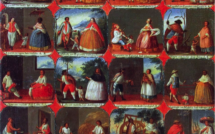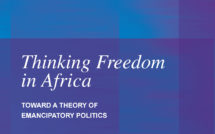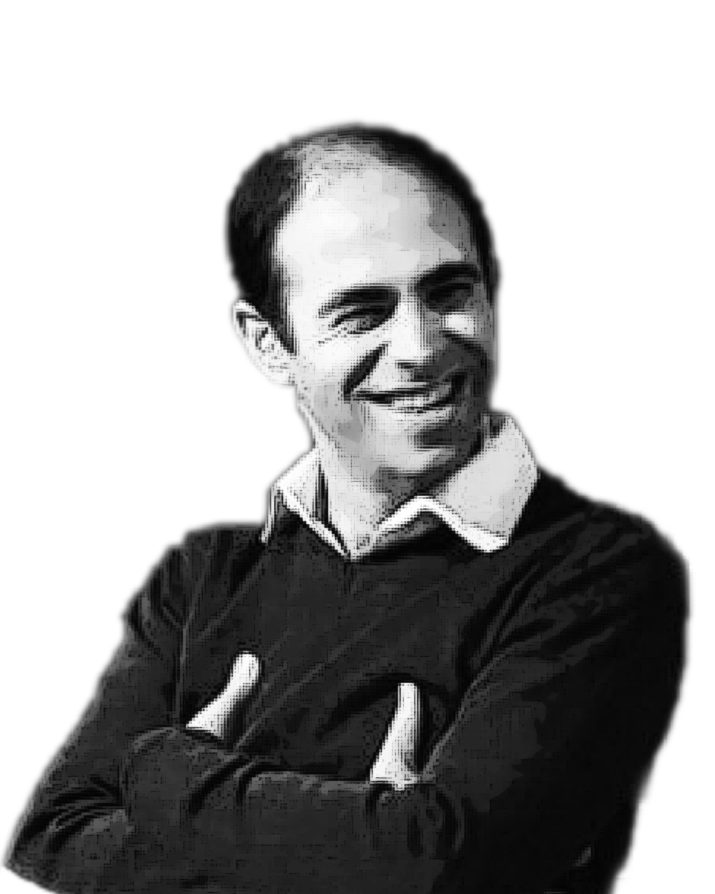
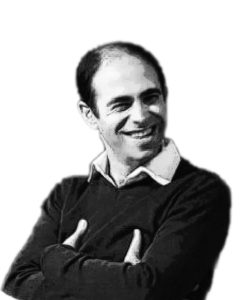
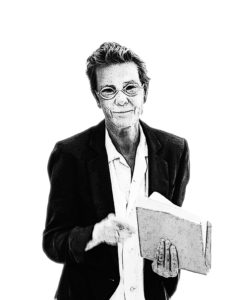
Translated from the French by Cole Swensen.
This is part of our special feature, Beyond Eurafrica: Encounters in a Globalized World.
ESSAY: FIGURES
The negative capability of the migrant
They – we ∙ They find themselves over there ∙ who are “they” and “we” ∙ I know that sometimes I find myself over there ∙ but that I am neither “they” nor “we” ∙ I find myself ∙ in airports ∙ transit terminals ∙ but what am I doing in these terminals ∙ undefined I participate in circulations ∙ others are not here there for the same reasons ∙ or again ∙ I don’t really have reasons ∙ if it’s not the journey ∙ sometimes the invitation /
/ others have to leave
figure one.
wealth stopped dead in the undergrowth at times at the edge of the path through the forest he fled as always his pelt his fur protecting him from the branches he is there also she at times just on the edge he fixes his quick eye on the striated variations of motion ∙ it’s the full light ∙ that attracted him ∙
In 1817, the English poet John Keats, not really a migrant, even if he’s buried far away, and almost predictably, in Rome. 1817: an expression, in a letter, “negative capability.”
“I had not a dispute but a disquisition with Dilke, upon various subjects; several things dove-tailed in my mind, and at once it struck me what quality went to form a Man of Achievement, especially in Literature, and which Shakespeare possessed so enormously – I mean Negative Capability, that is, when a man is capable of being in uncertainties, mysteries, doubts, without any irritable reaching after fact and reason – Coleridge, for instance, would let go by a fine isolated verisimilitude caught from the Penetralium of mystery, from being incapable of remaining content with half-knowledge. This pursued through volumes would perhaps take us no further than this, that with a great poet the sense of Beauty overcomes every other consideration, or rather obliterates all consideration.”
Not here /
Don’t count on me / to throw myself into Romanticism / to talk about it with a knowledgeable air / or / to say, others are already doing that, that we’re all Romantics / it’s not that — so why then Keats?
figure two.
She wanders off over by the hunting lodge ∙ She rests after a long morning ride ∙ She has eaten little ∙ She softly watches the animals ∙ Around her and farther off ∙ No doubt she’s going to leave again ∙ She created a manifest displacement in the sound ∙ But all is clear all the rhythms of others drift in from afar ∙ She’ll go off to join them; one leap will engender another and then another often to the other end of a pond because it’s often that’s where she finds them, those like her.
[…/]
… between Tijuana and San Diego, the dangerous border, the migrant who passes passes on his identity or recomposes it … he wears it behind the mask of migrant border-dweller and passes it on as contraband. Heriberto Yepez talks about this phantom identity. The border guard expects this response / it’s better to stage a short play that gives him what he expects to give him what he expects doesn’t amount to self-compromise but to passing that which otherwise would stay at the border / despite the overpowering though banal and daily domination of the border guard you can never really be sure who will carry the day /
… / …
when he can the migrant resists the condition imposed by circumstances not entirely of his choosing you could say that the migrant never really chooses the reason that leads him to try to cross the border / and yet there is no one migrant / if it’s true that you can’t speak of people in the singular you can’t speak of migrant in the singular —
figure three.
barely had time to see on the track over there the disappearance of that which must have been a body found later immobile or is it him his breath held almost stopped it’s that rapid he’s already slipped from sight that which is no longer anything but a fast mass to the eye is a body defined by heat.
then — there was — a marvelous — notion — it was the “nomad” — and — “nomadism” — they made nomad games / monad it seemed no doubt to apply to so many things — suddenly everything seemed nomadic / because everything seemed to be moving — even consumables were called “nomadic” — in order to sell them — it’s not because something to be consumed carries a name that the word is dead — in English they say commodity, is it because the nomad is commodious?
but a notion like this at a moment like this / that of stigmatized migration / can the work of migration be erased through nomadism / and if everything is nomadic is nothing nomadic — these are questions, addressed to friends —
figure four.
He took off, as you say, he left, fast, dashed, crossed the river, shook off his pursuers, then stopped, and slowly turned his massive head around, looking into the distance, toward and beyond the ford, they’re stuck, too deep, so he can take the path he’d hoped to take — before he, winding back and forth, had covered his tracks once, twice, two times, and again, and then this one too, he’d passed through mint, confused the scent, then crossed the river so that he could choose again among those that presented themselves to his retina
In the film Stop-Over, the Iranian migrants, having arrived illegally in Athens, try to cross borders. They need passports, real ones, not forgeries, but passports resold by a member of the so-called European community / then, once they get the passports, they have to learn how to look like the photo in the passport, learn the language spoken by the passport, and all the passport’s social customs / the condition of their passage is this capability to make themselves other in order to trick the big theater — in the film, one of the Iranian migrants has a facial deformation / he won’t be able to get across because he’ll never get a passport / negative capability doesn’t apply to him — he has to return / to Iran / and mysteriously die there
[… / …]
I can’t quite think of myself as a nomad — and I’m not complaining — it’s a rich person’s problem / the metaphorical nomad is he who has papers, he who is legal, he’s free to participate in the free circulation of people, airplanes, and objects
/ by that I mean / the “nomadic” is the problem of him who has too much and has already had too much — so I’m using the indefinite and forming this phrase — a negative capability of the migrant — what it means in the language of a country that speaks of itself as another to be the one that takes on that language.
Brecht had to seek refuge in the United States, as did many Germans, both Jewish and non-Jewish. He devotes a fair share of his journal to the issue: “Lately I’ve been glancing back through my notes. Of course, they’re fairly distorted, to protect me from undesirable readers, and it will be hard, really, to make any use of them later. Here I respect some boundaries, precisely because some borders are there to be crossed.” Polemical criticism of the United States: “They really are nomads. They change professions like they change their boots, build houses that last only twenty years and then don’t even live in them that long, and so their country is completely devoid of local reality.” /
Critical grammar
One plural embraces
One plural makes for diversity
One makes for generality
One makes for multiplicity
One plural says every + singular
One other says each + singular
figures
They have the extreme, soft, palpable, tangible sensation of glimmering each with his neck plunged in a basin of water, made artificial, they look at each other, clearly apt to scurry off, they know nothing of each other, to scrutinize, they possess the fragile, fluttering, heightened, exclamatory sensation of being able to leave at any moment, whenever they want
Vincent Broqua is a maître de conference at the Université de Paris 8. His critical book Starting from Nothing: The Aesthetics, Poetics, and Politics of the Minuscule came out in 2013, and a volume of poetry/essay, Récupérer, in 2015. He is a co-founder of the Franco-American poetry collective Double Change and the Université de Paris conference series Poets & Critics, which has been running since 2010.
Cole Swensen is the author of 17 books of poetry and a volume of critical essays and has translated over 20 volumes of contemporary French poetry, prose, and art criticism. A former Guggenheim fellow and co-editor of the Norton anthology American Hybrid, she is a professor at Brown University.
Published on March 1, 2018.

